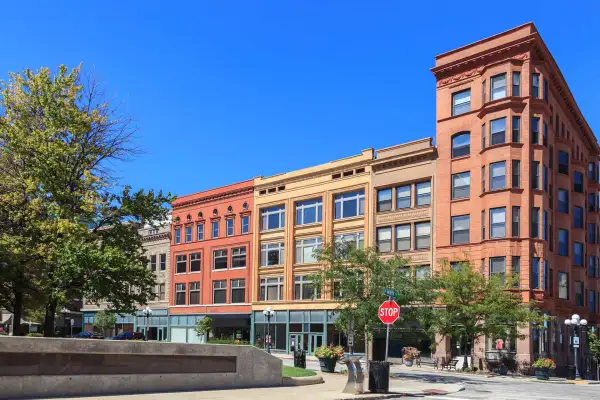20 Places Where It’s Easiest to Save for Your First Home

If you’re hoping to save up for your first home as fast as possible, the Midwest just might be the best place to start your search.
A new report from RentCafe, a real estate listing and research firm, looked at 174 metro areas to identify the cities where it’s typically quickest to save up for a 20% down payment on a starter home. And the Midwest dominated the rankings.
Bloomington, Illinois — where a median two-person family earns roughly $91,000 per year and the median starter home price is $105,249 — topped the list. By RentCafe’s calculations (using government data as well as data from Zillow), that two-person family can sock away 22% of their income and save enough money for a 20% down payment on a starter home in just one year.
Springfield, Illinois, ranked second, with a timeline of one year and three months to save for a down payment. The median price of a starter home in Springfield is just $81,901.
Seven of the 20 places on RentCafe’s list are located in Illinois, and 14 are in the Midwest. A handful of Midwestern cities including Beech Grove, Indiana, and Grimes, Iowa, also appeared on Realtor.com’s recent list of the best cities for first-time homebuyers thanks to their low cost of living, good job markets and large inventory of available homes.
Most of the places on RentCafe's list are small- and mid-sized cities, though larger metro areas like Washington, D.C., and Baltimore also make an appearance.
Where it’s easiest for first-time homebuyers to save for a down payment
Here are the top 20 cities where it’s easiest to save for your first down payment, according to RentCafe’s analysis, along with the estimated time it would take a two-person household to save up for a starter home in each.
The metro areas below include the surrounding area (occasionally in multiple cities and states) as well as the main city listed.
- Bloomington, Illinois: 1 year
- Springfield, Illinois: 1 year, 3 months
- Cedar Rapids, Iowa: 1 year, 9 months
- Trenton-Princeton, New Jersey: 1 year, 10 months
- Ann Arbor, Michigan: 2 years, 4 months
- Bismarck, North Dakota: 2 years, 4 months
- Bridgeport-Stamford-Norwalk, Connecticut: 2 years, 5 months
- Fargo, North Dakota-Minnesota: 2 years, 5 months
- Madison, Wisconsin: 2 years, 6 months
- Des Moines, Iowa: 2 years, 7 months
- Hartford-Middletown, Connecticut: 2 years, 8 months
- Fond du Lac, Wisconsin: 2 years, 8 months
- Champaign-Urbana, Illinois: 2 years, 8 months
- Baltimore-Columbia-Towson, Maryland: 2 years, 9 months
- Waterloo-Cedar Falls, Iowa: 2 years, 10 months
- Washington-Arlington-Alexandria, DC-Virginia-Maryland-West Virginia: 2 years, 10 months
- Cincinnati, Ohio-Kentucky-Indiana: 2 years, 11 months
- Akron, Ohio: 3 years, 1 month
- Decatur, Illinois: 3 years, 2 months
- Naples-Marco Island, Florida: 3 years, 3 months
It won’t be much easier to buy a house in 2022
Last year was tough for first-time homebuyers: One economist estimated that it was taking first-time buyers 10 months longer to save for a down payment in August of 2021 than it did before the pandemic.
Unfortunately, 2022 is shaping up to be difficult too, especially now that mortgage rates are rising to levels not seen since March 2020. Homebuyers should be prepared for the market to remain very competitive.
Keep in mind that while RentCafe’s analysis is based on a recommended 20% down payment, you don’t always have to put 20% down. The typical down payment for first-time homebuyers in 2021 was 7%, according to the National Association of Realtors.
More from Money:
Down Payment vs. Student Loans: How to Decide Where to Put Your Money
